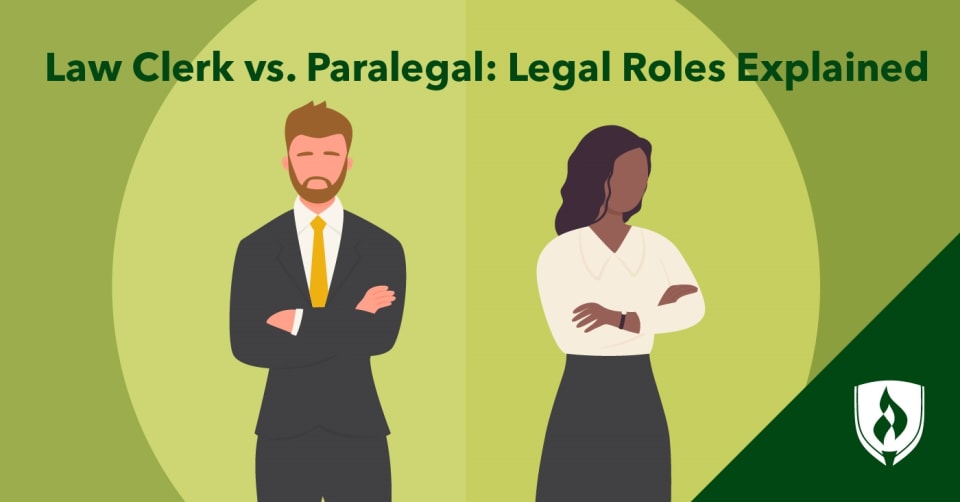Law Clerk vs. Paralegal: Legal Roles Explained
By Carrie Mesrobian on 11/01/2021
Legal thrillers and courtroom dramas have done much to raise the profile of attorneys and judges. We’re used to seeing lawyers make impassioned appeals to juries and judges bang gavels while laying down heavy consequences. But what we see less is the behind-the-scenes support that makes such dramatic spectacles possible, namely, the work of law clerks and paralegals.

If you’re not very familiar with the inner workings of our legal system, you might assume the role of a paralegal and a law clerk is largely the same. The truth is there’s quite a bit of difference between these important legal roles—and we can help clarify.
To get insight on what these two careers look like, we talked to a variety of legal professionals about what both roles require in terms of daily workload, education and where they fit within the justice system.
What's the difference between a law clerk and a paralegal?
According to Galia Aharoni Schmidt, attorney at Aharoni Business Law, the confusion between both roles stems from a lack of clear definitions.
“There are no formal definitions of law clerk and paralegal,” Aharoni Schmidt explains. “So, the roles look different from law firm to law firm.”
Benjamin Green, a paralegal at Halunen Law, says that one differentiator is that law clerks are usually law school students who aspire to become attorneys or are recent law school graduates.
“Law clerks tend to be law students who do a mix of shadowing attorneys in depositions, client meetings, mediations, and sometimes even trial,” Green explains. “Typically, law clerks are employed during summer when law school is not traditionally in session.”
Standards for law clerk employment vary among legal organizations. Some firms only employ law clerks who have completed law school, or those who have passed the bar exam, while others hire students who are still working toward their degree.
In contrast, paralegals are generally situated as support staff to attorneys, with specific training and education designed for that role.
“Paralegals are long haulers,” Green says. “Their tasks can run from general administration—phones, letters— to fact and legal research, and legal writing. Paralegals don’t usually go to mediations and depositions, because they have work to keep doing, but usually they go to trial.”
Depending on the needs and size of the legal firm, both roles could look similar when comparing organizations.
“Many of the tasks between the two positions often overlap,” says Jonathan Garza, an attorney at Herrman & Herrman. “The most significant difference between a paralegal and a law clerk may come down to education. A law clerk is a student studying to become an attorney while a paralegal has a post-high school education, but not at a law school.”
What neither law clerks nor paralegals are allowed to do is offer legal counsel or advice.
“The main danger is unauthorized practice of law, which is a criminal offense,” adds Green.
“Every law clerk and paralegal needs to be aware of the rules and adhere to them.”
What does a paralegal do?
A paralegal is generally employed by a law firm or legal office for their ability to assist lawyers with nearly all aspects of legal work and case-handling,” says J. Harrison Fulk, an attorney at Cox & Fulk.
Paralegals may do administrative tasks, like answering phones and managing paperwork, but they are often involved directly with clients and cases.
“Paralegals often assist in drafting pleadings and correspondence, monitoring cases to ensure adequate progress and compliance with deadlines and handling day-to-day communication with clients and third parties in their caseload where an attorney's personal involvement isn't necessary,” Fulk says.
What does a law clerk do?
While some law clerks often do many of the same tasks as paralegals, they are generally used for more in-depth analysis and legal review alongside attorneys or with judges.
“Law clerks, also called judicial assistants, help lawyers and/or judges in case management, drafting of opinions and orders, conducting legal research, procedural requirements, verifying case citations and determining legal alternatives or options,” explains Collen Clark, an attorney at Schmidt & Clark.
Where do these roles fit into the legal system?
Clark believes both law clerks and paralegals are essential to the practice of law.
“Both professions help keep the balance of the whole justice system,” Clark says. “Law clerks and paralegals are the keepers of the judiciary system and are significant contributors to ensuring public accountability.”
In this respect, their work reflects, positively or otherwise, on the legal firm or judicial bench that employs them.
“In the legal system, both clerks and paralegals are considered agents of their employers,” says Ard Ardalan, a former paralegal and current practicing attorney at Ardalan Law Firm. “A paralegal or clerk can bind the law firm that they work for by making representations on behalf of the attorney.”
Aharoni Schmidt finds that well-functioning legal firms use staff according to their client needs and budget.
“Efficient law firms utilize every member of the team to get the client the best, most thorough, and highest quality of service,” Aharoni Schmidt explains. “It doesn't make sense to have a $400/hour attorney spending time doing administrative tasks—both for law firm profit and also for the client's wallet!”
What does it take to become a law clerk or paralegal?
The pathway for a law clerk is usually one that includes studying to become an attorney, and in most cases, completing a law degree, as well as passing the bar.
“Aside from having a law degree, legal clerks may be required by judges to pass the bar exams,” says Clark.
The education path for a paralegal is not as long as that of a law clerk, and can be a combination of experience, education and training. Currently only one state (California) requires paralegals to obtain and hold a license to practice, which means most states leave training and education requirements for working as a paralegal up to employers. That said, most paralegals have at least an Associate’s degree. Claire Westbrook, founder of LSAT Prep Hero, says new paralegals typically have a mix of education and training as they get established in the field.
“Paralegals need at least an Associate's degree, at least 6 months of in-house paralegal training and typically at least 3 years of experience being supervised by an attorney,” Westbrook says.
To see what the paralegal requirements are for your state, visit the American Bar Association’s Educational Information for Paralegals page.
Is a legal career in your future?
Think a career working in the justice system sounds like a match for your skills and interests? Becoming a paralegal is an excellent way to get yourself established in this field in comparatively short order. If you’d like to learn more about what the process of becoming a paralegal entails, start with our article “How to Become a Paralegal: 4 Steps to Start Your Legal Career.”




